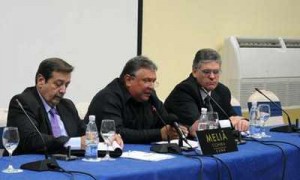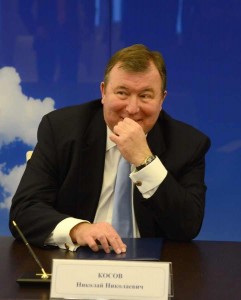
Cuba tells banking bloc why it needs foreign investment
 Cuba will need as much as $2.5 billion in direct foreign investment to boost its economy, said Cuba’s top economist, Marino Murillo Jorge, Thursday (May 8) in Havana.
Cuba will need as much as $2.5 billion in direct foreign investment to boost its economy, said Cuba’s top economist, Marino Murillo Jorge, Thursday (May 8) in Havana.
“The national economy needs an annual [growth] rate of between 5 and 7 percent” of the Gross Domestic Product, Murillo said. Instead, statistics show that in the past three years the growth rate has not risen above 3.2 percent. So far this year, it has been 2.2 percent, he said.
Murillo, vice president of the Council of Ministers, had stated his country’s needs in a public setting before, but this was a special event. He was addressing directors of the International Investment Bank (IIB) who were in Cuba to evaluate the nation’s ability to utilize their money, in the form of loans, and that of the countries they represent, in the form of direct investment.
The Moscow-based IIB describes itself as “a multilateral institution for development, which assists in social and economic development, growth of people’s well-being, and economic cooperation of the member-states.”
“The main directions of its activities are the support of the small and medium-sized business as well as participation in financing socially significant infrastructure projects,” the bank’s website says.
According to its mission statement, “the Bank grants loans primarily through the leading national financial institutions with the participation of the state, development banks, export and import banks and agencies; or it lends in partnership with other international institutions for development.”
Cuba’s appeal to the IIB for support comes two months after Havana issued a new Law on Foreign Investment, which will take effect on June 28.
The IIB was created in 1970 by the Council for Mutual Economic Assistance, an economic bloc founded in 1949 by the former Soviet Union and its allies. The bank’s current member states are Russia, Mongolia, Bulgaria, the Slovak Republic, the Czech Republic, Romania, Vietnam, and Cuba.

It is the only multilateral financial organization to which Cuba, a member since 1974, can turn for credit. Until this year, Cuba had not participated in IIB activities for almost 10 years, said Nikolai N. Kosov, chairman of the board.
The IIB is “a sure source” of investment and credit, Kosov said, which is why its directors are interested in every detail of the Cuban economic reform.
Murillo explained to the visitors the ongoing process of updating the Cuban economy — it is already in its second stage, he told them — and said that the government has decided to abolish the dual currency system and establish the national peso (CUP) as the only unit of currency.
He also told them that numerous economic sectors are open to foreign investment but that foreign economic participation will not affect the socialist nature of the government. Social ownership of the means of production will not be eliminated, he said.
Murillo said that Cuba is not contemplating a “structural change,” only a “modernization” of the management of the nation’s resources.
“The idea is to attain a prosperous and sustainable socialist model,” he said, “to present to the world a strategy of growth and, above all, development.” That development requires “a considerable rate of accumulation — from 20 to 25 percent — which indicates the need to access foreign capital,” he explained.
The economic reforms “have been carefully studied and well thought out,” he said, and the Cuban leadership knows when to apply them.
Other presentations were made by Neysa Delgado, Cuba’s delegate to the IIB and vice president of the Foreign Bank of Cuba, and Deborah Rivas, an official at the Ministry of Foreign Trade and Investment.
As the session ended, the president of the Central Bank of Cuba, Ernesto Medina Villaveirán, expressed to Kosov and Mongolian economist Demchigzhav Molmzamts a special recognition “for their systematic work in support of Cuba,” specifically in the renegotiation of Cuba’s debt to the IIB.


